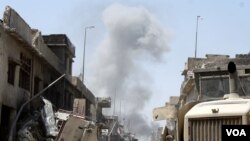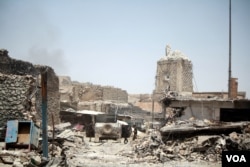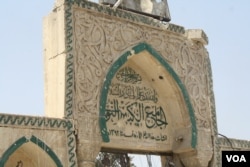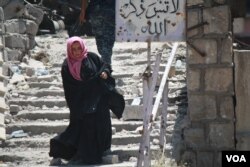Outside the general’s office, Raith al-Shababi, an Iraqi Special Forces fighter, flips through Facebook on his phone.
“This is my brother,” he said, showing a reporter a picture of a young man in a white dress shirt, posing with a serious, thoughtful face.
“Daesh,” al-Shababi explained, holding his finger up to his head like a gun. “Boom, boom.” Islamic State militants killed his brother at the age of 21.
Waiting for the generals to escort them on a victory tour of Mosul’s Old City, al-Shababi says Mosul has not been completely captured, but the end is near.
But the losses endured over eight months of fighting, three years of IS rule in Mosul and more than a decade of constant extremist attacks, he observes, make the coming milestone more sad than celebratory.
“We’ve won, but look around you,” said Col. Saaed Badeer Katam, of the Special Forces Najaf Battalion. “Everything is destroyed.”
Even the al-Nuri Mosque, the victory tour’s destination, is in ruins, with its iconic minaret chopped down and prayer space destroyed. Abu-Bakar al-Baghdadi declared himself “Caliph” of IS in 2014 in this mosque. Three years later IS destroyed it, apparently just to lessen Iraq’s triumph in Mosul.
Living in the battle zone, Col. Katam says he isn’t bothered that the declared victory precede the end of the fighting. As he speaks, airstrikes pound IS targets, and militants lob mortars and snap off sniper fire. Soldiers battle house to house, and families continue to flee the fighting.
Katam explodes IEDs that litter the re-captured streets of Old Mosul, hidden in debris and even in children’s toys. Buildings in the area are crushed and abandoned, and militants’ corpses rot in the streets. Under the piles of rubble are the remains of families killed when houses collapsed in airstrikes, sometimes burying them alive.
“I lost 25 of my friends in the fight for Mosul,” said Kaisar, 28, an Iraqi Special Forces fighter. When asked if he is happy about the victory, he replies, “I’m just tired. I want to go home.”
Coming battles
For Iraqi fighters, going home will be a break, but not the end of the war. Militants continue hiding out in Iraqi-controlled territory, poised to strike again. IS still holds large parts of Iraq, including parts of Anbar province, Hawija and the strategic city of Tal Afar, according to Col. Katam.
“Operations will continue until IS is finished,” he noted.
Tal Afar has been surrounded by Popular Mobilization Units, or Hashd Shaaby fighters, since last year, though an advance to retake the city itself has not yet begun.
And the terrain around Tal Afar is so rough that it is impossible to completely secure, added Katam. Militants fleeing other areas will finally retreat to the city if they can.
“The last place we fight will be Tal Afar,” he said. “And there, they will fight to the death.”
Hidden militants
“Sleeper cells” in Iraqi-controlled Mosul already are conducting attacks. Last week three suicide bombers targeted eastern Mosul, killing and maiming people in a market.
Early this week, 40 to 50 militants believed to be hiding out in an abandoned industrial zone overran two neighborhoods of western Mosul in an apparent attempt to distract Iraqi forces from their battle in Old Mosul.
“They thought Iraqi forces would leave Old Mosul so some other militants could escape,” said Sergeant Mahmoud Mohammad of the Iraqi Army’s 9th division. “But they failed.”
Special Forces and Iraqi Army soldiers killed all of the battling militants, he said, showing us bloodstains on the floor of one house. The blood is still sticky, and two bullet shells are on the floor. Mohammad thinks it was an IS double execution.
Returning neighbors say there was pandemonium when IS showed up in an area controlled by Iraq since mid-April. Families were separated as everyone ran when they saw the bushy beards and traditional clothes. They don’t know if anyone was killed.
Soldiers and civilians agree, however, that more sleeper cells are hiding out all over Mosul and that attacks are far from over.
“Of course we are always afraid,” said Mohammad, a 31-year-old father of seven who lives in Tenek, one of the areas briefly overrun by IS early this week. “But where else are we going to go?”









